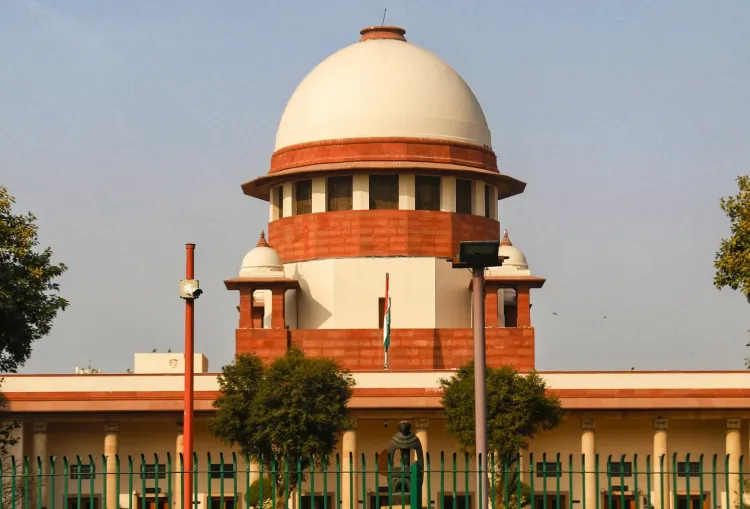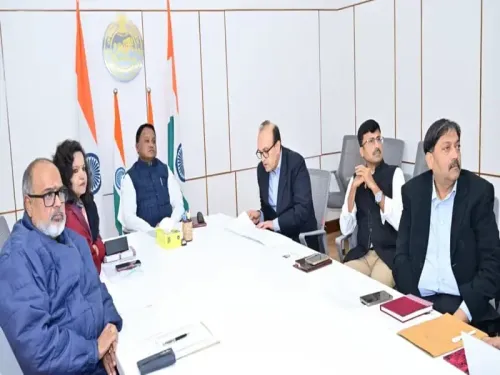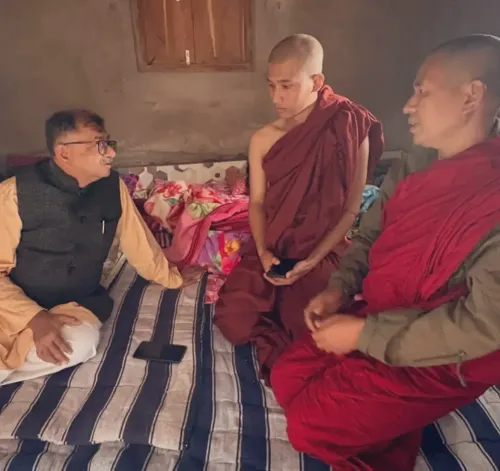Supreme Court Postpones Hearing on Challenges to Law Excluding CJI from EC Appointment Panel

Synopsis
Key Takeaways
- Hearing adjourned on petitions against new law excluding CJI from appointment process.
- Solicitor General requested postponement due to other engagements.
- New Chief Election Commissioner Gyanesh Kumar appointed.
- Concerns raised regarding the urgency of the matter.
- Previous Supreme Court ruling mandates CJI's inclusion in the appointment process.
New Delhi, Feb 19 (NationPress) The Supreme Court has postponed hearing on various petitions that contest the legislation passed by Parliament, which excludes the Chief Justice of India (CJI) from the appointment process for senior officials of the Election Commission.
A bench led by Justices Surya Kant and N. Kotiswar Singh agreed to the request made by Solicitor General Tushar Mehta, the second-highest law officer of the Centre, to delay the proceedings as he was engaged before the Constitution Bench considering whether courts can alter arbitral awards under the Arbitration and Conciliation Act, 1996.
On Monday, the Union government announced the appointment of Election Commissioner Gyanesh Kumar, a 1988-batch Kerala cadre IAS officer, as the new Chief Election Commissioner (CEC), succeeding Rajiv Kumar.
During a prior hearing, advocate Prashant Bhushan expressed concern that the challenges to the Chief Election Commissioner and the other Election Commissioners (Appointment, Condition of Service and Term of Office) Act, 2023 should be resolved swiftly.
Bhushan emphasized that the term of CEC Rajiv Kumar concluded on February 18, requesting that the matter be urgently set for a final hearing, or that an interim order might be necessary. However, SG Mehta argued against an interim stay on the enforcement of the contested law, stating that the Union government’s response was prepared, and the case should be scheduled for a final hearing.
In a hearing on January 8, Bhushan noted: "The current CEC is retiring on February 18 and a new Election Commissioner must be appointed. The key question is whether this appointment will follow the Constitution Bench judgment or the new law."
In March 2023, a Constitution Bench of the Supreme Court ruled that the appointment of senior officials of the Election Commission must be carried out by the President based on the advice of a panel comprising the Prime Minister, the Leader of the Opposition (LoP) in the Lok Sabha, and the Chief Justice of India.
"We declare that the appointment of the CEC and the other ECs shall be made based on recommendations from a tri-member committee consisting of the Prime Minister, the LoP of the Lok Sabha, and in the absence of a LoP, the leader of the largest opposition party in the Lok Sabha in terms of numerical strength, alongside the Chief Justice of India,” the apex court clarified, stating that its guidelines would remain in effect until Parliament enacts a law in line with Article 324(2) of the Constitution.
Following the apex court's ruling, Parliament introduced a law stating that the Chief Election Commissioner (CEC) and other Election Commissioners (ECs) will be appointed by the President based on the recommendations of a Selection Committee formed by the PM, the Leader of the Opposition (or the largest opposition party) in the Lok Sabha, and a Union Cabinet Minister nominated by the PM.
Numerous Public Interest Litigations (PILs) were submitted to the Supreme Court challenging the constitutional validity of the Chief Election Commissioner and the other Election Commissioners (Appointment, Condition of Service and Term of Office) Act, 2023. One plea, filed by a lawyer based in Noida, sought to annul the gazette notification issued by the Union government on December 28, 2023, and to reinstate the Chief Justice of India in the selection committee for the appointment of the CEC and ECs.
Additionally, it requested that the Union of India implement an independent and transparent selection system, establishing a neutral and independent selection committee for the appointments of the CEC and other ECs.










